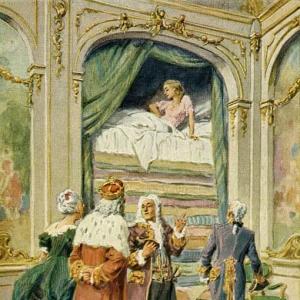Reading time: 22 min
In times gone by there was a king who had at the back of his castle a beautiful pleasure-garden, in which stood a tree that bore golden apples. As the apples ripened they were counted, but one morning one was missing. Then the king was angry, and he ordered that watch should be kept about the tree every night.
Now the king had three sons, and he sent the eldest to spend the whole night in the garden. So he watched till midnight, and then he could keep off sleep no longer, and in the morning another apple was missing. The second son had to watch the following night; but it fared no better, for when twelve o’clock had struck he went to sleep, and in the morning another apple was missing. Now came the turn of the third son to watch, and he was ready to do so; but the king had less trust in him, and believed he would acquit himself still worse than his brothers, but in the end he consented to let him try. So the young man lay down under the tree to watch, and resolved that sleep should not be master.
When it struck twelve something came rushing through the air, and he saw in the moonlight a bird flying towards him, whose feathers glittered like gold. The bird perched upon the tree, and had already pecked off an apple, when the young man let fly an arrow at it. The bird flew away, but the arrow had struck its plumage, and one of its golden feathers fell to the ground: the young man picked it up, and taking it next morning to the king, told him what had happened in the night.
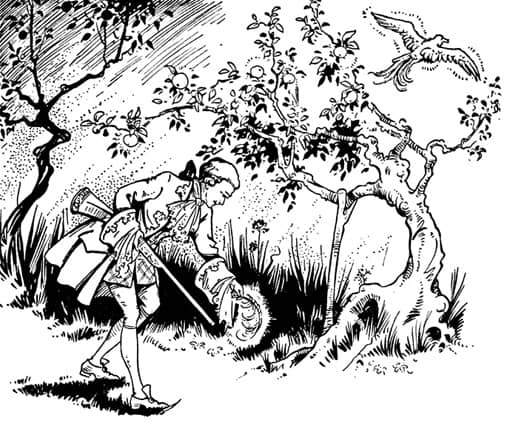
The king called his council together, and all declared that such a feather was worth more than the whole kingdom. „Since the feather is so valuable,“ said the king, „one is not enough for me. I must and will have the whole bird.“
So the eldest son set off, and relying on his own cleverness he thought he should soon find the golden bird.
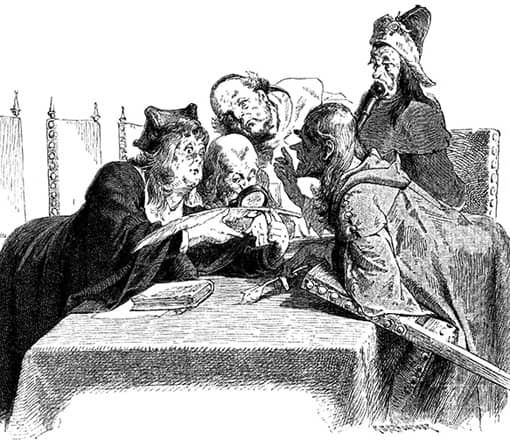
When he had gone some distance he saw a fox sitting at the edge of a wood, and he pointed his gun at him. The fox cried out, „Do not shoot me, and I will give you good counsel. You are on your way to find the golden bird, and this evening you will come to a village, in which two taverns stand facing each other. One will be brightly lighted up, and there will be plenty of merriment going on inside; do not mind about that, but go into the other one, although it will look to you very uninviting.“
„How can a silly beast give one any rational advice?“ thought the king’s son and let fly at the fox, but missed him, and he stretched out his tail and ran quick into the wood. Then the young man went on his way, and towards evening he came to the village, and there stood the two taverns. In one singing and dancing was going on, the other looked quite dull and wretched.
„I should be a fool,“ said he, „to go into that dismal place, while there is anything so good close by.“ So he went into the merry inn, and there lived in clover, quite forgetting the bird and his father, and all good counsel.
As time went on, and the eldest son never came home, the second son set out to seek the golden bird. He met with the fox, just as the eldest did, and received good advice from him without attending to it. And when he came to the two taverns, his brother was standing and calling to him at the window of one of them, out of which came sounds of merriment. So he could not resist, but went in and revelled to his heart’s content.
And then, as time went on, the youngest son wished to go forth, and to try his luck, but his father would not consent.
„It would be useless,“ said he; „he is much less likely to find the bird than his brothers, and if any misfortune were to happen to him he would not know how to help himself. His wits are none of the best.“ But at last, as there was no peace to be had, he let him go.
By the side of the wood sat the fox, begged him to spare his life, and gave him good counsel. The young man was kind, and said, „Be easy, little fox, I will do you no harm.“
„You shall not repent of it,“ answered the fox, „and that you may get there all the sooner, get up and sit on my tail.“ And no sooner had he done so than the fox began to run, and off they went over stock and stone, so that the wind whistled in their hair. When they reached the village the young man got down, and, following the fox’s advice, went into the mean-looking tavern, without hesitating, and there he passed a quiet night.
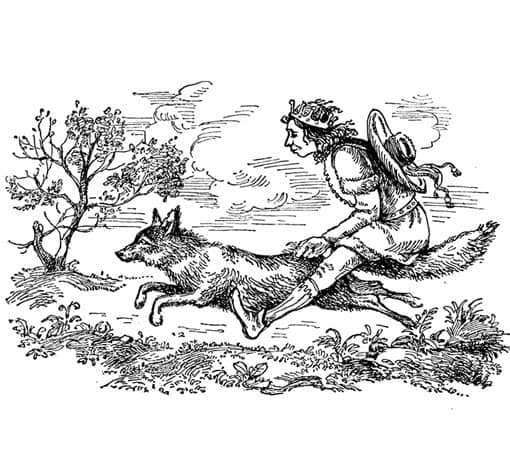
The next morning, when he went out into the field, the fox, who was sitting there already, said, „I will tell you further what you have to do. Go straight on until you come to a castle, before which a great band of soldiers lie, but do not trouble yourself about them, for they will be all asleep and snoring; pass through them and forward into the castle, and go through all the rooms, until you come to one where there is a golden bird hanging in a wooden cage. Near at hand will stand empty a golden cage of state, but you must beware of taking the bird out of his ugly cage and putting him into the fine one. If you do so you will come to harm.“ After he had finished saying this the fox stretched out his tail again, and the king’s son sat him down upon it. Then away they went over stock and stone, so that the wind whistled through their hair.
And when the king’s son reached the castle he found everything as the fox had said: and he at last entered the room where the golden bird was hanging in a wooden cage, while a golden one was standing by. The three golden apples too were in the room. Then, thinking it foolish to let the beautiful bird stay in that mean and ugly cage, he opened the door of it, took hold of it, and put it in the golden one. In the same moment the bird uttered a piercing cry. The soldiers awaked, rushed in, seized the king’s son and put him in prison.
The next morning he was brought before a judge, and, as he confessed everything, condemned to death. But the king said he would spare his life on one condition, that he should bring him the golden horse whose paces were swifter than the wind, and that then he should also receive the golden bird as a reward.
So the king’s son set off to find the golden horse, but he sighed, and was very sad, for how should it be accomplished? And then he saw his old friend the fox sitting by the roadside. „Now, you see,“ said the fox, „ail this has happened, because you would not listen to me. But be of good courage, I will bring you through, and will tell you how you are to get the golden horse. You must go straight on until you come to a castle, where the horse stands in his stable; before the stable-door the grooms will be lying, but they will all be asleep and snoring; and you can go and quietly lead out the horse. But one thing you must mind – take care to put upon him the plain saddle of wood and leather, and not the golden one, which will hang close by; otherwise it will go badly with you.“
Then the fox stretched out his tail, and the king’s son seated himself upon it, and away they went over stock and stone until the wind whistled through their hair. And everything happened just as the fox had said, and he came to the stall where the golden horse was: and as he was about to put on him the plain saddle, he thought to himself, „Such a beautiful animal would be disgraced were I not to put on him the good saddle, which becomes him so well.“
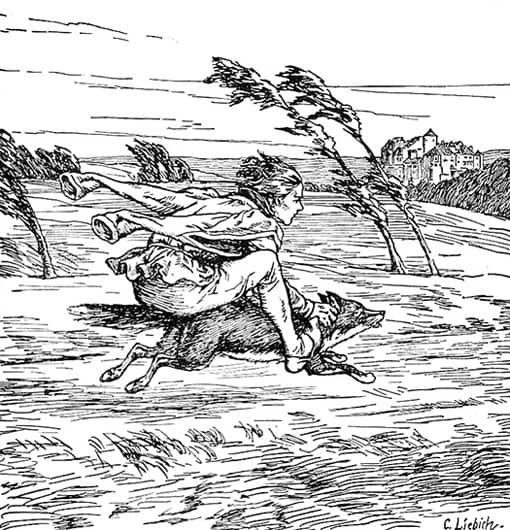
However, no sooner did the horse feel the golden saddle touch him than he began to neigh. And the grooms all awoke, seized the king’s son and threw him into prison. The next morning he was delivered up to justice and condemned to death, but the king promised him his life, and also to bestow upon him the golden horse, if he could convey thither the beautiful princess of the golden castle.
With a heavy heart the king’s son set out, but by great good luck he soon met with the faithful fox. „I ought now to leave you to your own ill-luck,“ said the fox, „but I am sorry for you, and will once more help you in your need. Your way lies straight up to the golden castle: you will arrive there in the evening, and at night, when all is quiet, the beautiful princess goes to the bath. And as she is entering the bathing-house, go up to her and give her a kiss, then she will follow you, and you can lead her away; but do not suffer her first to go and take leave of her parents, or it will go ill with you.“ Then the fox stretched out his tail. The king’s son seated himself upon it, and away they went over stock and stone, so that the wind whistled through their hair.
And when he came to the golden castle, all was as the fox had said. He waited until midnight, when all lay in deep sleep, and then as the beautiful princess went to the bathing-house he went up to her and gave her a kiss, and she willingly promised to go with him, but she begged him earnestly, and with tears, that he would let her first go and take leave of her parents. At first he denied her prayer, but as she wept so much the more, and fell at his feet, he gave in at last.
And no sooner had the princess reached her father’s bedside than he, and all who were in the castle, waked up, and the young man was seized and thrown into prison. The next morning the king said to him, „Thy life is forfeit, but thou shalt find grace if thou canst level that mountain that lies before my windows, and over which I am not able to see: and if this is done within eight days thou shalt have my daughter for a reward.“ So the king’s son set to work, and dug and shovelled away without ceasing, but when, on the seventh day, he saw how little he had accomplished, and that all his work was as nothing, be fell into great sadness, and gave up all hope.
But on the evening of the seventh day the fox appeared, and said, „You do not deserve that I should help you, but go now and lie down to sleep, and I will do the work for you.“ The next morning when he awoke, and looked out of the window, the mountain had disappeared. The young man hastened full of joy to the king, and told him that his behest was fulfilled, and, whether the king liked it or not, he had to keep to his word, and let his daughter go. So they both went away together, and it was not long before the faithful fox came up to them.
„Well, you have got the best first,“ said he. „But you must know the golden, horse belongs to the princess of the golden castle.“ – „But how shall I get it?“ asked the young man. „I am going to tell you,“ answered the fox. „First, go to the king who sent you to the golden castle, and take to him the beautiful princess. There will then be very great rejoicing. He will willingly give you the golden horse, and they will lead him out to you. Then mount him without delay, and stretch out your hand to each of them to take leave, and last of all to the princess, and when you have her by the hand swing her up on the horse behind you, and off you go! nobody will be able to overtake you, for that horse goes swifter than the wind.“
And so it was all happily done, and the king’s son carried off the beautiful princess on the golden horse. The fox did not stay behind, and he said to the young man, „Now, I will help you to get the golden bird. When you draw near the castle where the bird is, let the lady alight, and I will take her under my care. Then you must ride the golden horse into the castle-yard, and there will be great rejoicing to see it, and they will bring out to you the golden bird; as soon as you have the cage in your hand, you must start off back to us, and then you shall carry the lady away.“ The plan was successfully carried out; and when the young man returned with the treasure, the fox said, „Now, what will you give me for my reward?“ – „What would you like?“ asked the young man. „When we are passing through the wood, I desire that you should slay me, and cut my head and feet off.“
„That were a strange sign of gratitude,“ said the king’s son, „and I could not possibly do such a thing.“ Then said the fox, „If you will not do it, I must leave you; but before I go let me give you some good advice. Beware of two things: buy no gallows-meat, and sit at no brook-side.“ With that the fox ran off into the wood.
The young man thought to himself, „That is a wonderful animal, with most singular ideas. How should any one buy gallows-meat? and I am sure I have no particular fancy for sitting by a brook-side.“ So he rode on with the beautiful princess, and their way led them through the village where his two brothers had stayed. There they heard great outcry and noise, and when he asked what it was all about, they told him that two people were going to be hanged. And when he drew near he saw that it was his two brothers, who had done all sorts of evil tricks, and had wasted all their goods. He asked if there were no means of setting them free.
„Oh yes! if you will buy them off,“ answered the people. „But why should you spend your money in redeeming such worthless men?“ But he persisted in doing so; and when they were let go they all went on their journey together.
After a while they came to the wood where the fox had met them first, and there it seemed so cool and sheltered from the sun’s burning rays that the two brothers said, „Let us rest here for a little by the brook, and eat and drink to refresh ourselves.“ The young man consented, quite forgetting the fox’s warning, and he seated himself by the brook-side, suspecting no evil. But the two brothers thrust him backwards into the brook, seized the princess, the horse, and the bird, and went home to their father.
„Is not this the golden bird that we bring?“ said they. „And we have also the golden horse, and the princess of the golden castle.“ Then there was great rejoicing in the royal castle, but the horse did not, feed, the bird did not chirp, and the princess sat still and wept.
The youngest brother, however, had not perished. The brook was, by good fortune, dry, and he fell on soft moss without receiving any hurt, but he could not get up again. But in his need the faithful fox was not lacking. He came up running, and reproached him for having forgotten his advice.
„But I cannot forsake you all the same,“ said he; „I will help you back again into daylight.“ So he told the young man to grasp his tail, and hold on to it fast, and so he drew him up again. „Still you are not quite out of all danger,“ said the fox; „your brothers, not being certain of your death, have surrounded the wood with sentinels, who are to put you to death if you let yourself be seen.“ A poor beggar-man was sitting by the path, and the young man changed clothes with him, and went clad in that wise into the king’s courtyard.
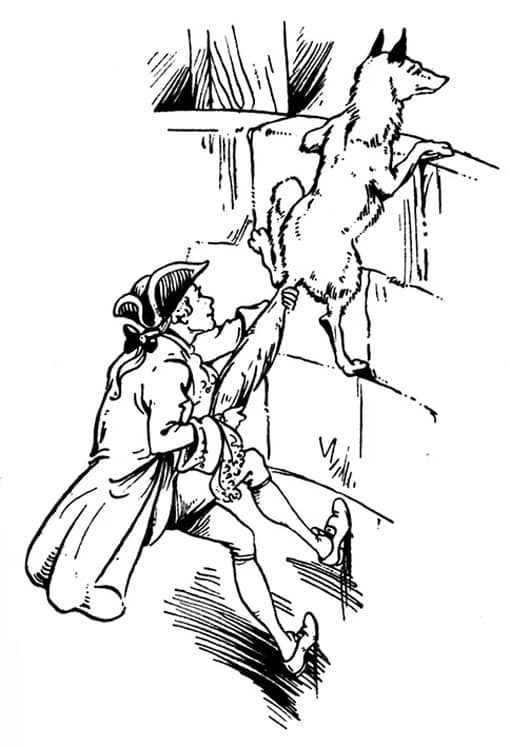
Nobody knew him, but the bird began to chirp, and the horse began to feed, and the beautiful princess ceased weeping.
„What does this mean?“ said the king, astonished. The princess answered, „I cannot tell, except that I was sad, and now I am joyful. It is to me as if my rightful bridegroom had returned.“ Then she told him all that happened, although the two brothers had threatened to put her to death if she let out anything.
The king then ordered every person who was in the castle to be brought before him, and with the rest came the young man like a beggar in his wretched garments; but the princess knew him, and greeted him well, falling on his neck and kissing him. The wicked brothers were seized and put to death, and the youngest brother was married to the princess, and succeeded to the inheritance of his father.
But what became of the poor fox? Long afterwards the king’s son was going through the wood, and the fox met him and said, „Now, you have everything that you can wish for, but my misfortunes never come to an end, and it lies in your power to free me from them.“ And once more he prayed the king’s son earnestly to slay him, and cut off his head and feet. So, at last, he consented, and no sooner was it done than the fox was changed into a man, and was no other than the brother of the beautiful princess; and thus he was set free from a spell that had bound him for a long, long time. And now, indeed, there lacked nothing to their happiness as long as they lived.
 Learn languages. Double-tap on a word.Learn languages in context with Childstories.org and Deepl.com.
Learn languages. Double-tap on a word.Learn languages in context with Childstories.org and Deepl.com.Backgrounds
Interpretations
Adaptions
Summary
Linguistics
„The Golden Bird“ is a fairy tale collected by the Brothers Grimm, Jacob and Wilhelm, in their famous anthology „Grimms‘ Fairy Tales“ or „Kinder- und Hausmärchen.“ First published in 1812, the collection aimed to preserve German folktales and oral storytelling traditions, many of which had been passed down through generations. The Brothers Grimm were dedicated to capturing these stories and immortalizing them in written form.
„The Golden Bird“ tells the story of a king whose golden apples from a special tree are being stolen by a mysterious golden bird. The king sends his three sons on a quest to find and capture the bird. The two older sons are easily distracted and fail in their mission, while the youngest son, often referred to as the „simpleton,“ proves to be resourceful, kind, and ultimately successful in his quest. Along the way, the youngest son encounters a talking fox who provides him with guidance and assistance. By following the fox’s advice, the simpleton captures the golden bird, as well as a golden horse and a beautiful princess. In the end, the simpleton is betrayed by his older brothers but is saved by the fox, who reveals himself to be a cursed prince. The simpleton marries the princess, and the prince is freed from his curse.
The story has roots in European folklore and shares similarities with other folktales from different cultures. Its themes and motifs, such as the quest for a magical item, the youngest son who triumphs over his older siblings, and the magical helper, are common in various fairy tales and legends. These elements reflect the universality of human experiences and values and emphasize the importance of kindness, humility, and perseverance.
The Brothers Grimm collected „The Golden Bird“ from oral storytelling traditions and made adaptations to fit the literary and cultural sensibilities of their time. As a result, the fairy tales in their collection, including „The Golden Bird,“ serve as both a reflection of the original oral tradition and the literary culture of early 19th-century Germany.
„The Golden Bird“ is just one of many stories that contribute to the rich tapestry of European folklore, demonstrating the enduring appeal of fairy tales and their ability to captivate and inspire generations of readers and listeners.
„The Golden Bird“ from the Brothers Grimm offers multiple themes and moral lessons that can be interpreted in various ways. Here are a few possible interpretations of the tale.
The Importance of Humility and Kindness: The youngest son, or the „simpleton,“ is often considered less capable than his older brothers, yet he prevails in the end. His humility and kindness towards others, such as the talking fox, ultimately contribute to his success. This interpretation emphasizes the importance of treating others with respect and compassion, regardless of their appearance or status.
Perseverance and Determination: The simpleton’s determination to fulfill his father’s wishes and his persistence in the face of adversity demonstrate the importance of never giving up. Despite setbacks and obstacles, he remains focused on his quest, ultimately achieving his goal. This interpretation highlights the value of perseverance and determination in overcoming challenges.
The Role of Wisdom and Guidance: Throughout the story, the simpleton receives advice from the talking fox. By following the fox’s wisdom, he is able to avoid pitfalls and make the right choices. This interpretation suggests that seeking and heeding wise counsel can be crucial in achieving one’s goals and overcoming challenges.
The Triumph of the Underdog: The simpleton, initially considered less capable and less worthy than his older brothers, ultimately proves himself to be the true hero of the story. This interpretation focuses on the idea that underestimated individuals can rise above expectations and achieve greatness, emphasizing the importance of believing in oneself and one’s abilities.
The Power of Transformation and Redemption: The talking fox, who is revealed to be a cursed prince, experiences redemption and transformation at the end of the story. This interpretation suggests that change and growth are possible for everyone, and that individuals can overcome past mistakes or misfortunes.
Overall, „The Golden Bird“ presents various themes and moral lessons that can resonate with readers and listeners of all ages. Its timeless messages of humility, kindness, perseverance, and the power of transformation continue to inspire and captivate audiences across different cultures and generations.
„The Golden Bird“ is a classic fairy tale that has been adapted and retold in many forms over the years. Here are some notable adaptations of the tale.
Disney’s „The Three Caballeros“ (1944) is a Latin-American musical film that features an animated retelling of „The Golden Bird“ as part of its plot. In the film, Donald Duck, Jose Carioca, and Panchito Pistoles embark on a quest to find the golden key that unlocks the mystery of the titular three caballeros.
The Golden Bird (1979) is a Soviet stop-motion animation film that retells the story of „The Golden Bird“ with a more whimsical and colorful aesthetic. The film features elaborate sets and costumes, as well as catchy songs and lively dance numbers.
The Golden Bird (1990) is a Chinese television series that adapts the story of „The Golden Bird“ into a historical drama set in ancient China. The series features a large ensemble cast, intricate period costumes, and lavish sets and locations.
„The Golden Bird“ has also been adapted into several books and graphic novels, including „The Golden Bird: Grimms‘ Fairy Tales“ (1993) by Jacob and Wilhelm Grimm, and „The Golden Bird and Other Stories: 101 Fairy Tales“ (2014) by Jane Carruth.
In addition, the story has inspired numerous stage productions and theatrical adaptations, such as „The Golden Bird: A New Musical“ (2017) by Darryl Maximilian Robinson, which adds original songs and choreography to the classic tale.
Overall, „The Golden Bird“ has proven to be a timeless and versatile tale that continues to inspire artists and entertain audiences of all ages and backgrounds.
<
„The Golden Bird“ is a fairy tale from the Brothers Grimm that follows the adventures of a king’s youngest son as he embarks on a quest to find a magical golden bird. The story emphasizes themes such as humility, kindness, perseverance, and the importance of wise counsel.
The tale begins with a king whose precious golden apples are being stolen by a mysterious golden bird. The king sends his three sons, one at a time, to find and capture the bird. The two older sons become distracted and fail in their mission. In contrast, the youngest son, often referred to as the „simpleton,“ proves to be resourceful and committed to the task.
During his quest, the simpleton encounters a talking fox who offers him guidance. The fox advises him not to stay at the same inns as his brothers and gives him further instructions on how to capture the golden bird, a golden horse, and a beautiful princess. The simpleton follows the fox’s advice, succeeding in obtaining all three treasures.
However, the simpleton’s older brothers become envious of his success and betray him, stealing the treasures and leaving him for dead. The talking fox rescues the simpleton and helps him regain the stolen treasures. As they return to the kingdom, the fox reveals that he is actually a cursed prince and requests the simpleton’s help to break the curse.
In the end, the simpleton returns to his father’s kingdom with the golden bird, the golden horse, and the princess. He marries the princess, and with his help, the fox-prince is freed from his curse. The story concludes with the simpleton’s triumph, as his kindness, humility, and perseverance lead to success and happiness.
The fairy tale „The Golden Bird“ by the Brothers Grimm is a rich narrative that showcases themes of perseverance, wisdom, and transformation, set against a backdrop of royal quests and magical elements. A linguistic analysis of this tale reveals several important features in terms of structure, language, and its adherence to traditional fairy tale motifs.
Structure and Narrative
The tale follows a classic tripartite structure, common in fairy tales, where three attempts are made to achieve a goal, with the third being successful. This structure not only builds suspense but also emphasizes the theme of persistence. The story is highly episodic, with each son undertaking a quest that ultimately contributes to the youngest son’s success. This format is typical of oral storytelling, making it easy to remember and engaging for audiences.
Language and Style
Repetition and Parallelism: The narrative employs repetition, particularly in the encounters with the fox and the sequence of events with the taverns, castles, and tasks. This repetitive structure reinforces the moral lessons of the tale and emphasizes the contrast between the actions of the brothers.
Direct Speech: Dialogue is frequently used to convey critical plot points and character interactions. The fox, in particular, provides direct counsel to the youngest son, acting as a guide. This use of dialogue helps animate the characters and move the plot forward dynamically.
Descriptive Language: While the language is straightforward, vivid descriptions are used for key elements, such as the golden bird, the horse, and the princess. These descriptions underscore the magical and desirable nature of these objectives, symbolizing wealth, speed, and beauty.
Themes and Motifs
Quest and Adventure: A core component of the narrative is the quest motif, involving journeys to obtain the golden bird, horse, and princess. These quests symbolize the trials and tribulations necessary for personal growth and the attainment of ultimate happiness.
Transformation and Redemption: The theme of transformation is central, culminating in the fox’s restoration to human form. This transformation aligns with many fairy tales where characters are redeemed or cursed individuals are set free through acts of bravery or kindness.
Wisdom and Folly: The contrasting actions of the brothers highlight wisdom versus folly. The youngest son, initially underestimated, succeeds by adhering to advice and exercising compassion, unlike his older brothers who succumb to temptation and superficial choices.
Magic and the Supernatural: Supernatural elements, such as the talking fox, magical bird, and enchanted horse, create a world where the impossible becomes possible. This aspect is fundamental to the enchantment of fairy tales, allowing characters to transcend everyday limitations.
Morality and Justice: The tale includes moral and ethical lessons through the consequences faced by the characters. The elder brothers’ fate serves as a cautionary reminder of the perils of greed and deceit, while the youngest son’s rise to success affirms the value of integrity and moral righteousness.
Cultural and Historical Context
As a product of the Brothers Grimm, “The Golden Bird” reflects the socio-cultural values of 19th-century Germany, embedding lessons on familial duty, justice, and the virtues of perseverance. The tale also encapsulates the Grimm brothers‘ mission to preserve folklore, capturing elements particular to the European fairy tale tradition, such as royal backdrops, magical creatures, and moral teachings.
Overall, „The Golden Bird“ stands as a quintessential fairy tale, with its blend of wonder, moral instruction, and a satisfying resolution that rewards virtue while punishing vice. Its linguistic elements and narrative structure effectively communicate its themes, making it a timeless piece within the fairy tale canon.
Information for scientific analysis
Fairy tale statistics | Value |
|---|---|
| Number | KHM 57 |
| Aarne-Thompson-Uther-Index | ATU Typ 550 |
| Translations | DE, EN, EL, DA, ES, PT, HU, IT, JA, NL, PL, RO, RU, TR, VI, ZH |
| Readability Index by Björnsson | 33.3 |
| Flesch-Reading-Ease Index | 80.5 |
| Flesch–Kincaid Grade-Level | 7.6 |
| Gunning Fog Index | 10.2 |
| Coleman–Liau Index | 7.3 |
| SMOG Index | 8 |
| Automated Readability Index | 8.3 |
| Character Count | 16.171 |
| Letter Count | 12.374 |
| Sentence Count | 140 |
| Word Count | 3.150 |
| Average Words per Sentence | 22,50 |
| Words with more than 6 letters | 339 |
| Percentage of long words | 10.8% |
| Number of Syllables | 3.852 |
| Average Syllables per Word | 1,22 |
| Words with three Syllables | 97 |
| Percentage Words with three Syllables | 3.1% |
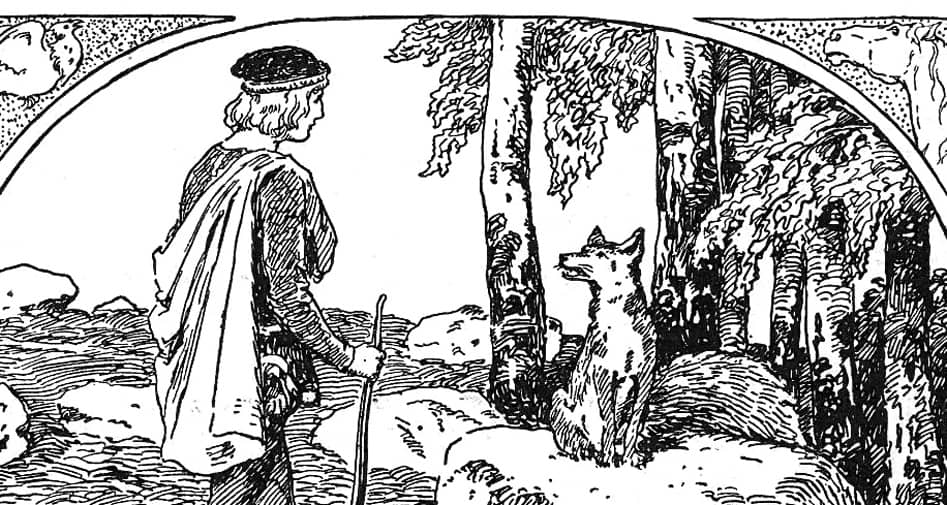
 Facebook
Facebook  Whatsapp
Whatsapp  Messenger
Messenger  Telegram
Telegram Reddit
Reddit
